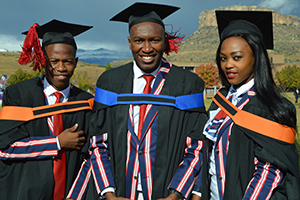
Qwaqwa Campus SRC President, Njabulo Mwali
(centre), flanked by Ntokozo Masiteng (left) and
Ntokozo Thango (right), after their graduation.
In an unprecedented move, the University of the Free State’s Chancellor, Dr Khotso Mokhele, took a special moment to congratulate graduating student leaders during the recent ceremonies held on the Qwaqwa Campus.
"I am very proud that we are a university where the SRC Presidents graduate," he said, referring to both the current and former SRC Presidents, Njabulo Mwali and Paseka Sikhosana, respectively graduating with a Bachelor of Science (Information Technology) and a Bachelor of Education (FET Phase).
"There are many universities where you have professional SRC Presidents, spending years and years on campuses and hardly going through the second year, and then they fight the hardest against exclusions," he said.
Two other members of the current SRC Qwaqwa Campus also graduated during the Humanities ceremony held on Friday 12 May 2017. They are Ntokozo Masiteng (Student Development and Environmental Affairs) and Ntokozo Mbali Thango (Sports Affairs).
Over 550 degrees and certificates were conferred in three ceremonies, which kicked off the University of the Free State’s graduation season. These included five PhDs from the Faculty of Natural and Agricultural Sciences.